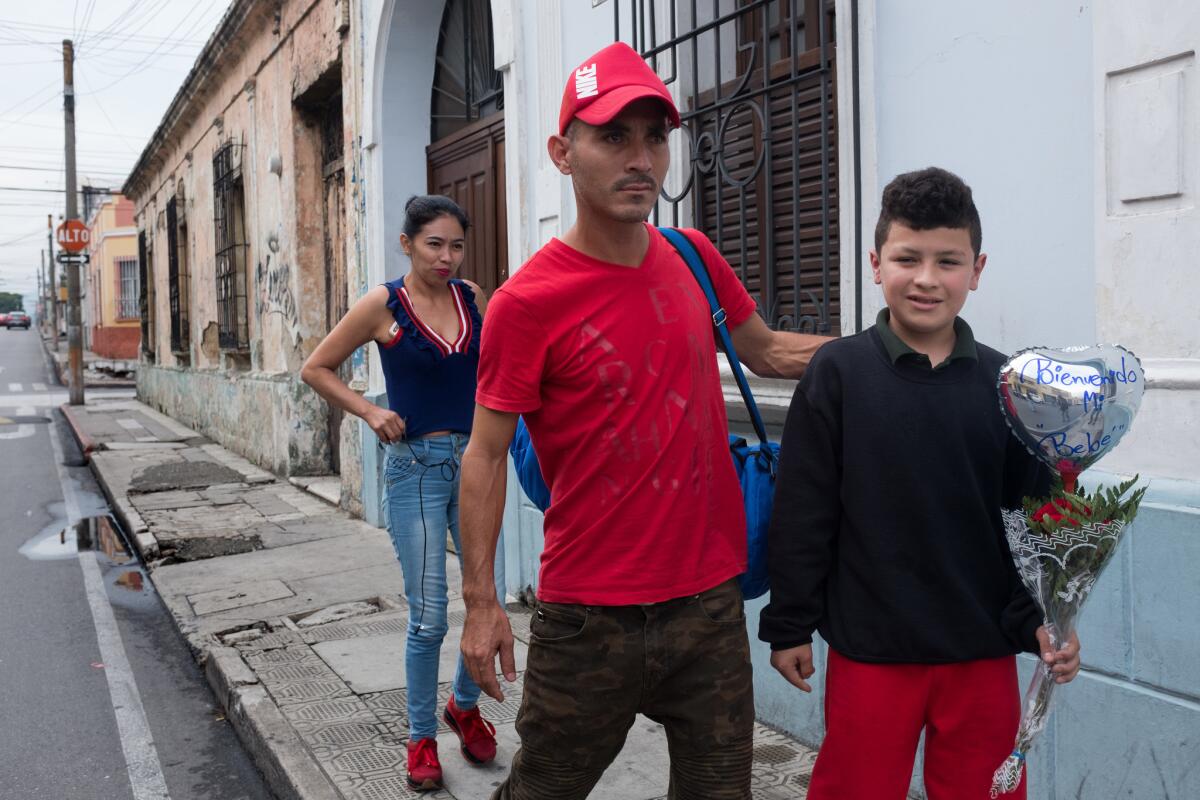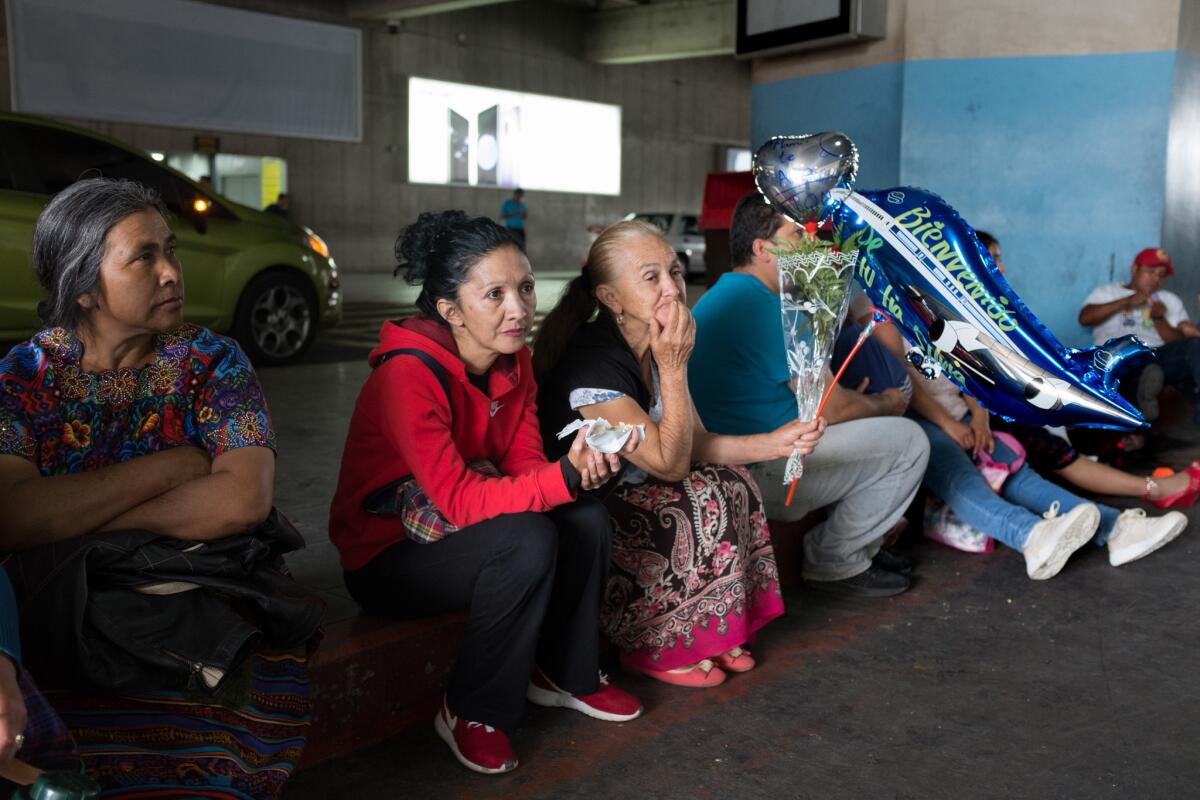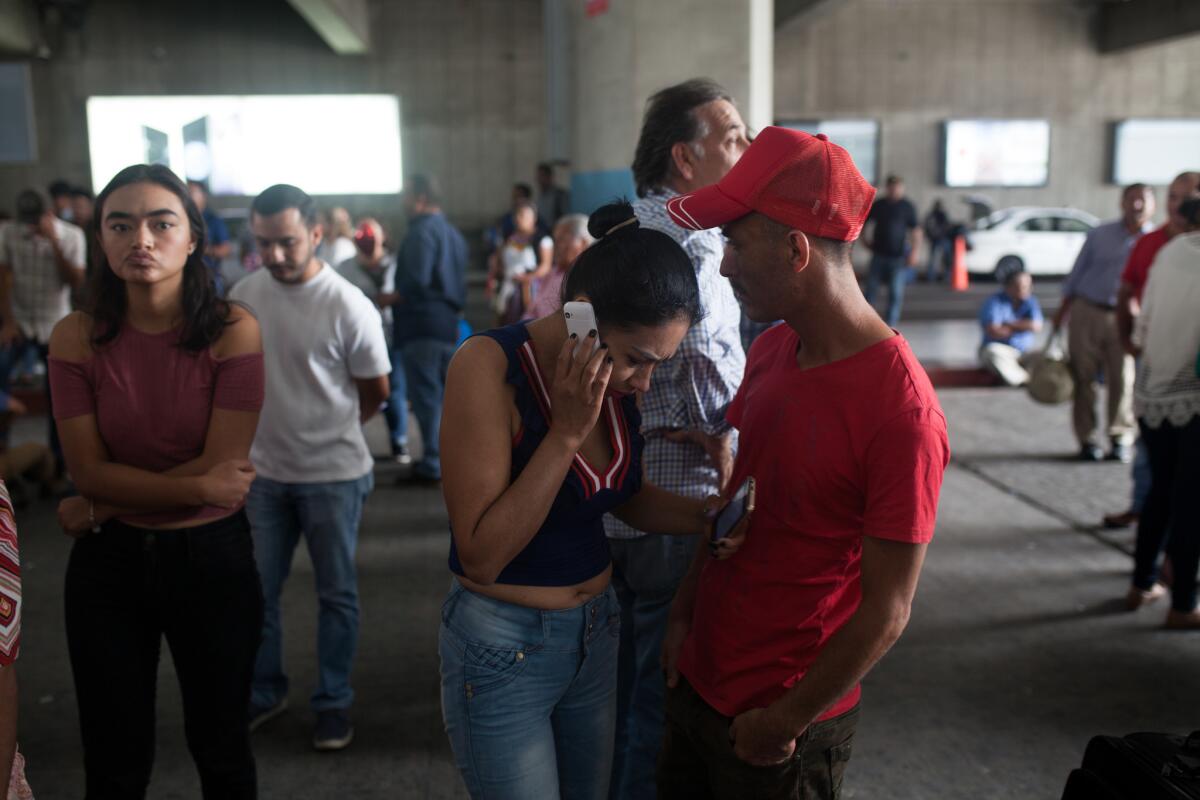Guatemalan parents reunited with son held in detention, but they’re worried: ‘He’s not the same boy’
- Share via
Reporting from GUATEMALA CITY — Over the last month, Nuria Lanuza noticed a troubling change in her son Erik. During their weekly phone conversations, he used to be talkative and spoke loudly. In time, however, he began to speak quietly. His answers were short, his words slow.
The mother chalked it up to sadness. She was in Guatemala and Erik was in an immigration detention center for children in the Chicago area. He and his father had hoped to get asylum in the U.S., and while Erik was held in detention, his father was deported.
But this week they learned of another possible reason for the change in their son. At a governmental reception center in Guatemala City where the family was reunited Wednesday, Lanuza and her husband, Erik Castillo, learned that while in Chicago their 12-year-old son had been put on an antipsychotic drug called risperidone — a powerful medication used to treat bipolar disorder and schizophrenia. It’s also used to control extreme emotions, thoughts and behaviors.
Lanuza knew Erik had been briefly hospitalized in the U.S. for depression, but she never agreed for him to be administered medication, she said.
“Is that good medicine? Or bad? I’m worried,” the mother asked her husband. He shook his head.
The family finally reclaimed their son after he spent more than four months in detention. Erik’s aunt Sylvia Castillo dug through his blue duffel bag, pulling out orange-colored Play-Doh and the boy’s deportation documents before finding a prescription bottle for risperidone from Walgreens.
“This is what they’ve used to sedate him,” she told his mother. “This is why he’s not the same boy.”

Erik is one of more than 2,500 children the United States government separated from their parents after the Trump administration instituted a “zero tolerance” policy requiring anyone who crossed the border at unofficial ports of entry to be prosecuted, including people who gave themselves up to border officials, asking for asylum.
The move ignited an worldwide uproar and was eventually stopped, but not before many adults were sent to Central America, leaving behind about 400 children — including Erik. His mother, father, grandmother, aunt and uncle traveled to the capital of Guatemala City on Wednesday, waiting to embrace the boy they hadn’t seen since May. But the family said Erik was no longer the same. He wouldn’t look his mother in the eyes when he spoke. He kept his head down.
Lanuza cajoled him to hug her, but he seemed content to keep at a distance and fidget with the silver heart-shaped balloon she’d just given him. “Bienvenido mi bebe,” it said. Welcome, my baby.
Immigrant advocates have sued the U.S. government, charging that more than 30 minors have been improperly medicated at federally contracted immigrant shelters without parental or judicial consent. Justice Department attorneys have said that the Office of Refugee Resettlement, which oversees the shelters, has the authority to medicate children without parents’ consent because the youths are in the agency’s custody.
Erik and his father were the first in the family to journey to the U.S. Castillo, 39, said they hoped to escape poverty and mounting debt, and Lanuza and Erik’s siblings, an older sister and younger brother, were supposed to join them later.
Castillo said he and Erik gave themselves up to border authorities once they reached San Luis, Ariz., in early May. After the second day in detention, his son was taken away. The boy cried, and Castillo said he tried in vain to console him.
Castillo said immigration officials forced him to sign documents despite his objections. He can’t read or write in English or Spanish, and he said he doesn’t know what he signed but was told Erik would be given back to him if he signed his deportation documents.
Immigrant advocates allege that immigrants often are cajoled into signing documents saying they agreed to be deported — a charge government agencies deny.
Eight days later after Castillo signed, he was deported. His son remained in the U.S.
Documents obtained by ProPublica Illinois and shared with the Los Angeles Times show that Erik was one of several children sent to Illinois shelters run by Heartland Human Care Services, a nonprofit that has a federal contract to house detained immigrant children in several facilities in the Chicago area.
Erik was first flown to Chicago and taken to a facility called Casa Guadalupe. About a month later, he was moved to a facility that serves youth who need specialized mental health services.
While in custody, records show, the boy struggled to adjust. He acted out and became aggressive with staff and other children. At one point, Erik became so combative that he had to be physically restrained for more than two hours, according to medical records.
Wednesday, in an interview with The Times, Erik said he was given “medicine so I wouldn’t make a fuss.”
“I felt better with the medicine,” he said. “I was feeling really bad because I wasn’t with my mom or dad.”
Erik became so depressed that he was admitted to a psychiatric hospital for a week and diagnosed with adjustment disorder, according to medical records. He had difficulty sleeping and impulse control issues, documents show.
In July, he was given the drug guanfacine, which is used to treat attention deficit hyperactivity disorder. Later, he was given fluoxetine, an antidepressant, but was eventually taken off the medication because his aggression continued, documents show.
“I’m sad. I don’t want to be here anymore,” Erik said he told shelter workers. He said their typical response was, “Behave well and you’ll go home quickly.”
Recently, Erik said he came to believe he would never see his parents again.
Initially, he was scheduled to return to his family Aug. 22, but that trip was canceled at the last minute for unclear reasons.
“You’re not going to send me back, are you?” he asked his social worker.


More complications delayed their reunion Wednesday. Though the mother was told to report to a governmental reception center at 11:30 a.m. in Guatemala City, she decided to head to the airport instead. Lanuza wanted to make sure Erik’s plane landed safely — maybe even catch a glimpse of her son. She didn’t.
Instead, the family ended up hurrying to the reception center after an official called to say it was the only way they could reclaim their son. Still, Erik didn’t arrive until nearly three hours later. The reunion took place behind doors, away from public view.
As soon as the family emerged from the reception center, they hopped in their sedan and headed home. They had an eight-hour journey ahead of them to the town of La Mesilla, and it was already close to 5 p.m. Dark clouds gathered in the sky, threatening heavy rain.
In the car, Erik flashed a smile when he spoke with cousins on his mother’s cellphone. But the spirited boy who left in May was now diminished, the aunt said.
During a pit stop, the family broke into a heated debate about whether to take Erik off the medication immediately.
Abruptly halting treatment with risperidone can cause intense withdrawal symptoms, including irritability, delusions, hallucinations and other psychotic symptoms. But the family didn’t know all that.
Lanuza said she knew Erik was hyperactive and had learning problems at school, but she couldn’t afford to get him to a doctor.
Now, she wanted to take the boy to a psychiatrist before taking him off the drug. She worried about the cost. The family is still struggling to pay more than $5,000 they borrowed for the father and boy to be smuggled to the U.S., she said.
“He probably needs the medicine,” she told her husband.
“I’m his father. They never asked me for permission to give him this drug,” Castillo said. “He won’t need that drug anymore. Those drugs can be addictive. He’ll become dependent on it.”
The grandmother nodded in agreement.
“He’ll be fine now. He’s with family and will be happy now,” she said. She hugged Erik, placing a kiss on his forehead.
“He was just not used to being caged in like that,” added his aunt, Sylvia Castillo. “He’s traumatized because of it. Maybe people over [in the U.S.] are used to being enclosed all the time, but not here. He’ll be OK here. Here, he’ll be free.”
Twitter: @thecindycarcamo
More to Read
Sign up for Essential California
The most important California stories and recommendations in your inbox every morning.
You may occasionally receive promotional content from the Los Angeles Times.











